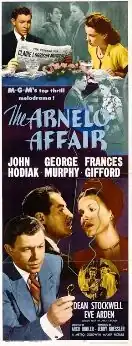The Arnelo Affair
| The Arnelo Affair | |
|---|---|
 Theatrical release poster | |
| Directed by | Arch Oboler |
| Screenplay by | Arch Oboler |
| Based on | the short-story "I'll Tell My Husband" by Jane Burr |
| Produced by | Jerry Bresler |
| Starring | John Hodiak George Murphy Frances Gifford Dean Stockwell Eve Arden |
| Cinematography | Charles Salerno Jr. |
| Edited by | Harry Komer |
| Music by | George Bassman |
Production company | |
| Distributed by | Loew's, Inc. |
Release date |
|
Running time | 86 minutes |
| Country | United States |
| Language | English |
| Budget | $892,000[1] |
| Box office | $838,000[1] |
The Arnelo Affair is a 1947 American film noir produced by MGM and starring John Hodiak, George Murphy, and Frances Gifford. The picture was co-written and directed by Arch Oboler. Dean Stockwell and Eve Arden appear in support.[2]
Plot
A prosperous Chicago lawyer's wife, Anne Parkson is bored and neglected. Mostly with her husband, Ted, but even her café society friends. She begins meeting with her Ted's new client, nightclub owner Tony Arnelo, having agreed privately with him to help him with some interior design work. Arnelo's intentions are clear: he wants her. She struggles to resist, and does, desperately seeking a rekindling of attention, ideally passion, from her work-obsessed husband. One afternoon she arrives at Tony's for her usual 2 PM rendezvous, and soon after his girlfriend Claire shows up. She is upset by Anne being there, recognizes she's being replaced by a new flame, and starts a fuss. Tony arrives, slaps her, and Anne runs out.
Police find the girlfriend murdered the same night, with Anne's unique compact, a recent anniversary gift from Ted, lying near the body. It had actually fallen out of Anne's purse when she had fled Tony's car after the row, but Tony had planted it to falsely implicate Anne as the killer and blackmail her into an affair. Ideally, in his mind, leaving her husband, and marriage to him.
The same night, as a surprise (and imagined treat) for Anne, Ted gathers their closest friends for a night out at Arnelo's swanky club. When Claire's murder comes up, Tony over-plays his hand, grandstanding in front of everyone, including a homicide detective, Sam Leonard, who'd joined the table. Anne faints, and goes under a doctor's care. She gets a bottle of sleeping pills, intending suicide.
Meanwhile, Ted discovers Anne had a key to Tony's luxury apartment, and confronts him there, only to be shown the compact and an unfinished goodbye note from Anne also spilled in his car "implicating" her in the murder, and an affair that had never been consummated. Even though Ted is a capable "paperwork" lawyer, he is unskilled in criminal law, and falls for it all. Believing he's checkmated, he backs down.
Anne takes the sleeping pills at the same time that Leonard picks up Tony and tells him he's got enough on him that he's "going to fry". Tony counters that the charges will never stick, and he'll walk. Leonard, dogged, tells him he'll go to trial anyway, and while he might shirk off the effects of an acquittal, Anne will be both publicly and privately ruined.
Always an admixture of the good and the bad, the "raised on the wrong side of the tracks" Tony actually does care deeply for Anne, and Leonard's warning resonates. Knowing he's cornered no matter what he does his instinct is still to flee, and he does. Leonard pursues him, orders him to halt, then drops him with two shots. Before he expires Tony tells Ted he'd lied about the whole thing, clearing Anne.
By the time Ted can rush home a doctor has cared for Anne, and she's out of danger. They fall into eachother's arms.
Cast
- John Hodiak as Tony Arnelo
- George Murphy as Ted Parkson
- Frances Gifford as Anne Parkson
- Dean Stockwell as Ricky Parkson
- Eve Arden as Vivian Delwyn
- Warner Anderson as Detective Sam Leonard
- Ruth Brady as Dorothy Alison
- Lowell Gilmore as Dr. Avery Border
- Archie Twitchell as Roger Alison
- Ruby Dandridge as Maybelle, the Maid
- Joan Woodbury as Claire Lorrison
Reception
Box office
The film earned $524,000 in the US and Canada and $314,000 elsewhere, against production costs of $892,000, incurring a loss.[1]
Critical response
Contemporary reviews were mixed. New York Times film critic Bosley Crowther panned the film. He wrote, "And childish it is, beyond question, despite the promising presence in the cast of John Hodiak, Frances Gifford, George Murphy and other minor 'names.' It's a 'stream of consciousness' fable about a lawyer's neglected wife who takes up with a night-club owner and gets into a most embarrassing jam. It is unmercifully slow and sombre and utterly devoid of surprise."[3]
Variety magazine's review at the time was more positive. The staff wrote, "Arch Oboler, radio’s master of suspense, has effectively transposed his technique into the visual medium with The Arnelo Affair. Strictly speaking this is not a whodunit, nor can it be catalogued as a psychological suspense picture ... There’s never a question as to who committed the murder, but the crime is secondary to its effect on the characters involved. Until the film’s very climax, no hint is given to the ultimate denouement. Dialogue instills the feeling of action where none exists for much of the footage, and the gab is excellent but for a couple of spots when Oboler gives vent to florid passages."[4]
References
- ^ a b c The Eddie Mannix Ledger, Los Angeles: Margaret Herrick Library, Center for Motion Picture Study.
- ^ The Arnelo Affair at the AFI Catalog of Feature Films
- ^ Crowther, Bosley. The New York Times, film review, September 13, 1947. Accessed: August 11, 2013.
- ^ Variety. Staff film review, 1947. Accessed: August 11, 2013.